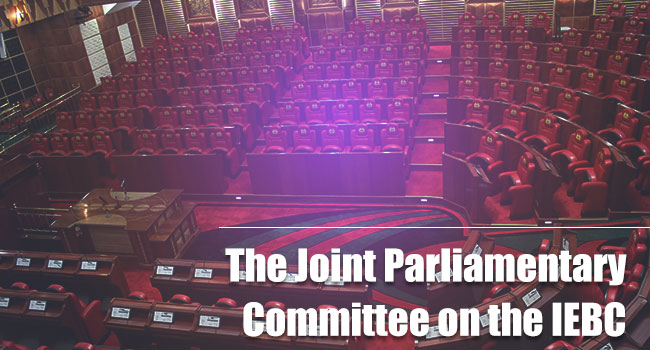Report On The Presentation By EACLJ To The Parliamentary Committee On IEBC

In the beginning of July, the Senate and the National Assembly approved a motion that established a Joint Parliamentary Select Committee meant to deal with matters relating to the Independent Electoral and Boundaries Commission (IEBC).
This committee is meant to:
- Inquire into allegations against the IEBC Commissioners and Secretariat.
- If necessary, recommend legal mechanisms in which the Commissioners and Secretariat can vacate office in accordance with the Constitution
- Recommend legal, policy and institutional reforms to strengthen the IEBC and improve the Electoral System and Processes so as to ensure the next elections are free and fair, and that they are administered in an impartial, efficient, simple, accurate, verifiable, secure, accountable and transparent manner.
- And finally, on the basis of any findings and recommendations made, prepare a report and a draft bill or draft bills.
This Select Committee is also required to receive views from experts, members of the public, the business community, civil society, religious groups, political parties, county governments and any other persons on matters regarding the IEBC and the Electoral Process.
A gazette notice has invited the aforementioned people to make distinct presentations in any or all of the following Thematic Areas.
- Thematic Area 1 – Allegations against the Commissioners and the Secretariat of the IEBC, specifically on the following
- Credibility
- Impartiality
- Integrity
- Independence
- Thematic Area 2 – Recommendations on the legal mechanisms needed if the current Commissioners and Secretariat of the IEBC were to leave office in accordance with the Constitution.
- Thematic Area 3 – Recommendations on the legal, policy and institutional reforms needed to strengthen the IEBC so as to ensure that the next elections are free and fair and administered in an impartial, efficient, verifiable, secure and transparent manner. The following should specifically be addressed.
- The composition of the IEBC and the Secretariat
- The appointment, term of office, terms of service and removal from office of the IEBC Commissioners and Secretariat.
- Thematic Area 4 – Recommendations on the legal, policy and institutional reforms needed to improve the Electoral System and Processes to ensure transparent and free elections. The following should be addressed
- Voter Registration
- Voter Education
- Nomination and Registration of Candidates
- Campaign Management
- Publicity and Media
- Use of Information Communication Technology in the Elections
- Voting Process
- Transmission and Declaration of Election Results
- Allocation of Special Seats
- Election Observation, Monitoring and Evaluation
- Dispute Resolution (Including Nominations and Petitions)
The East Africa Center for Law and Justice prepared two distinct memoranda (documents) to this effect on Thematic Area 3 and Thematic Area 4. We were given an opportunity to make an Oral Presentation before the Select Committee on Wednesday 27th July 2016.
The EACLJ, represented by Murimi Karani, highlighted the contents of our Memoranda and welcomed comments and questions from the members of the committee. The following were some of the issues of contention.
- The swearing in of the President pending a Presidential Election Petition to the Supreme Court. Inquired by Senator Mutula Kilonzo Jr.
- Voting at any poll station as opposed to the current system where you are tied to one polling station. Issue raised by Honorable Mishi Mboko.
- The inclusion of voter education in the school curriculum. Supported by Honorable Junet Mohamed.
- The deficiency of Identification Cards (ID Cards), registration of the ID Cards in tandem with voter registration and the use of IDs to vote thus doing away with the voters card altogether. Issue raised by Senator Beatrice Elachi.
- Our suggestion to have the Party Lists of nominated candidates for special seats submitted before the elections and its effect on party hopping.
- Our recommendation to have members of the IEBC appointed on a rotational basis and their number reduced to between three and five commissioners.
Below are the final drafts submitted to the committee





